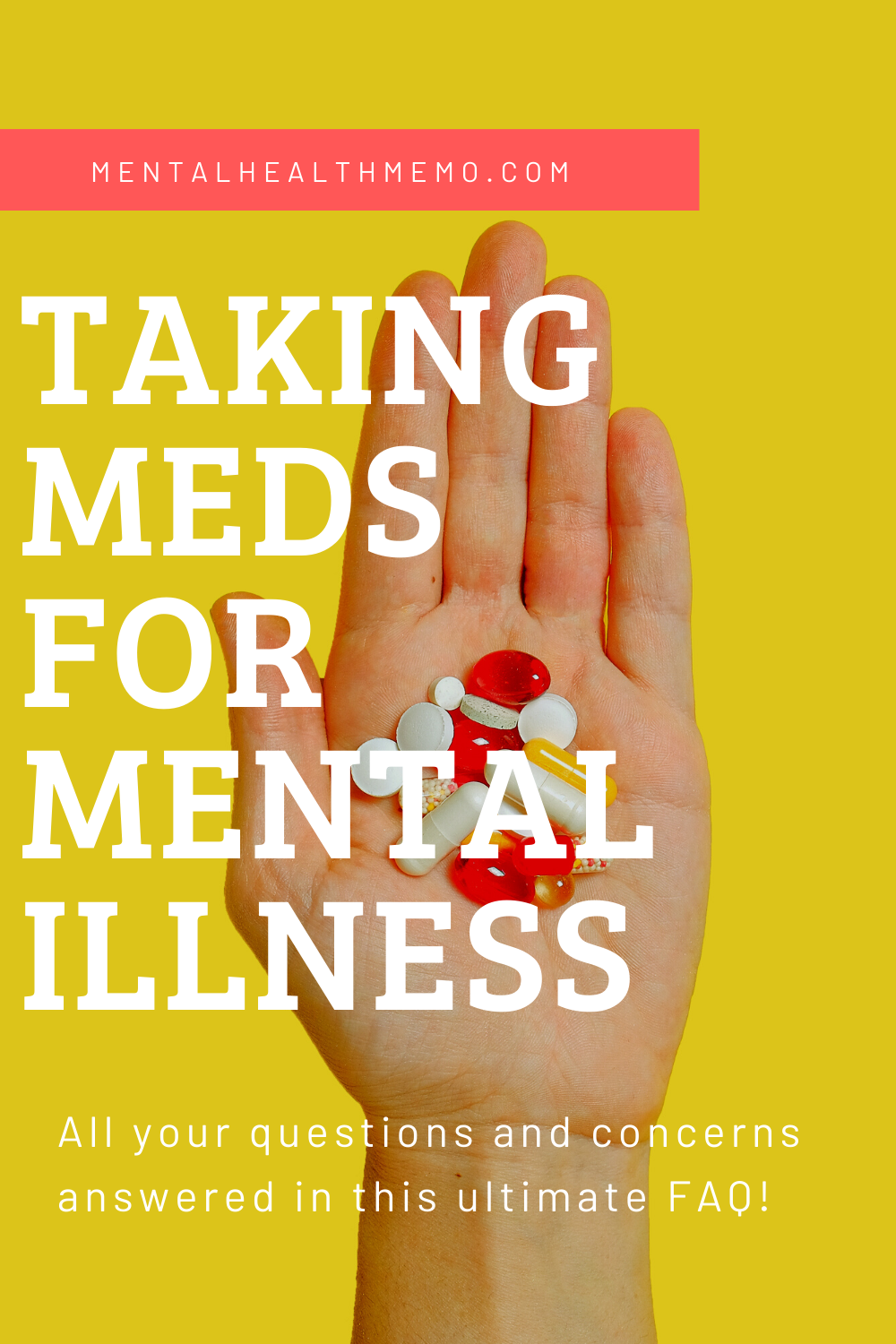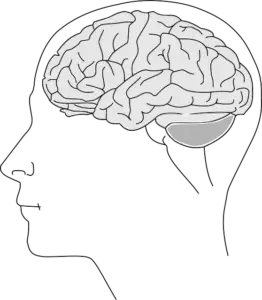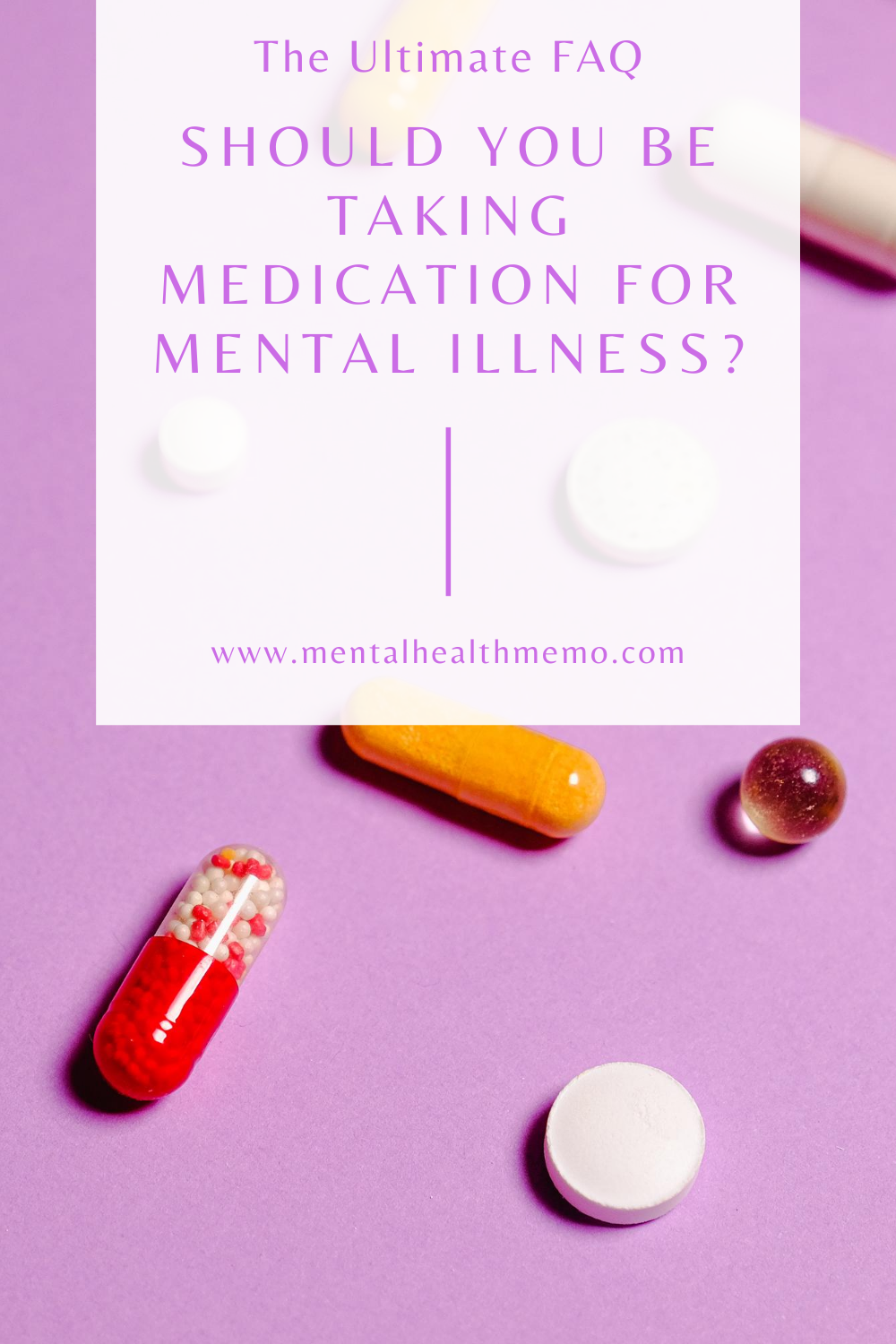The Controversy About Taking Medication for Mental Illness
Medication for mental illness is a controversial and hot topic. People are either completely for it, against it, or just plain confused. And I totally get why!
Media often capitalizes on the worst-case scenario of medication by showing people in mental institutions losing their sense of self. Alternatively, the medical world preaches medication and often use it as a first course of action.
The holistic world thinks these medications are horrible and destructive, while cultural norms dictate how acceptable it is to take medicine for mental health.
No wonder people are unsure about how to approach medication for mental illness!
So I’ve created this post to help cover every possible question, concern, and angle of taking medication for your mental health.
This is all going to be based on what I have learned at school (Social Work and Psychology), as well as what I have learned over my personal journey with medication for my anxiety and mood disorders.
*I’m not a doctor, so please take this post simply as an overview. If you have any questions and/or concerns, please speak to your health care provider or a mental health professional*
We have lots to get through so let’s get right into it!

Do You Need Medication?
This is obviously going to be the first step in this whole process.
Do you feel like you need medication to help you feel better?
It’s important that you decide this for yourself (of course there are exceptions to this if you have psychotic, severe symptoms or are in-patient. In those cases you might not always have the choice).
When figuring out if you need medication, it’s important to evaluate how it is exactly that you’re feeling, what it is you want to be improved, and what’s currently lacking.
From a practitioner’s point of view, you only want to introduce medication if the person is overwhelmed or unable to participate in their regular life due to their mental illness.
If you feel like your symptoms are getting in the way of you living your life, medication may be a potential option for you.
But it’s important to note that sometimes, we ourselves cannot see ourselves clearly.
For example, when an individual with Bipolar Disorder is in a manic state, they feel like they’re on top of the world.
So at that moment, they won’t want medication because they think they’re just fine. But they do. They just can’t see it.
Alternatively, maybe you don’t really need the medication and a bit of therapy would suffice (more on that in a bit).
Because of this, it’s important to talk to those we spend the most amount of time with, as well as our health care providers to ensure we get a well-rounded idea of the situation and whether medication is a good idea.
What Role Does Therapy Play?
When discussing whether you need medication, it’s also incredibly important to think about whether you may just need therapy only.
Or maybe you need both medication and therapy.
Therapy is a great way to learn coping skills that you can carry with you for the rest of your life.
This can be more beneficial than just going on medication that you may eventually stop taking and end up back where you were before.
But typically, therapy and medication go best hand in hand.
Medication can take the edge off which will make therapy easier to work through. By going through therapy you learn about yourself and how to cope better which improves the quality of your life.
It’s kind of a nice package.
But it doesn’t necessarily have to be that way if you don’t want it to be.
For example, when doing therapy I was offered medication but I didn’t want to take any. So I just did therapy by itself until I was able to be part of the world again.
It was the right choice for me at the time.
But I did end up dabbling a little bit in medication later on when I felt like I had learned everything there is to know in therapy and wanted to try medication to see if it would help.
So there is no right way to do it.
But regardless of what you choose, it’s important to consider therapy if you’re also considering medication.
Setting the Right Expectations
A lot of times people go into medication thinking that it’s a magical fix (and that’s what I thought too).
But the truth is that it isn’t.
As my doctor, psychiatrist, and social worker explained: “It simply lowers the volume in your head”.
The problems are still going to be there. They won’t disappear and you won’t be cured.
But medication will make it much more manageable and not as hard on you.
It’s incredibly important that you know this going in so that you’re not disappointed or frustrated when you’re still having symptoms.
But this isn’t to say medication doesn’t make a huge impact. For some folks, medication is the only reason they can partake in life.
This is all just to say that you need to have the right expectations so you don’t get hurt.
Types of Prescription Medication for Mental Illness
There are different types of medications and your health professional will give you one (or more) of these groups depending on what you need.
Generally speaking, there are:
- Antidepressants which are used dominantly for depression but also sometimes for anxiety, ADHD, and pain. (Examples are SSRIs like Sertraline, Citalopram, and Fluoxetine. As well as SNRIs like Venlafaxine and Duloxetine)
- Anti-anxiety medications which are used for anxiety disorders and panic attacks.(Examples are Benzodiazepines like Clonazepam, Lorazepam, and Alprazolam. It’s important to note however that Benzodiazepines are not taken every day but rather as needed because of how addictive they are)
- Stimulants which are used dominantly for ADHD. (Examples are Methylphenidate, Amphetamine and Dextroamphetamine )
- Anti-psychotic medications that are dominantly used to treat psychosis but can also be combined to help other mental health conditions.(There are 2 generations of antipsychotic medication: typical and atypical. Which type you’ll take depends on your doctor’s recommendation)
- Mood stabilizers which are often used for Bipolar Disorder and other mental health conditions, or to help other medications work better.(Lithium is a common example, but there are also anticonvulsant drugs such as Valproic Acid that can act as mood stabilizers despite being made for seizures)
This is just the bird’s eye view on medication for mental illnesses. There is A LOT more than just this.
But it’s important to just have an idea so you can feel more comfortable in your knowledge, and so you can communicate with your doctor if you think something might work well for you.
However, please ultimately leave the cocktail mixing to your doctors and pharmacists.

Natural Medication and/or Supplements.
Some folks may prefer to take natural supplements, which is also a very realistic option.
However I would like to note that research for natural supplements is all over the place, limited, often not scientifically sound and it’s inconsistent.
And just because something is natural does not necessarily mean that it has no side effects or consequences.
However, it is possible that the reason you may be feeling a certain way is because of an over or underproduction of something in your body.
So in that case a supplement would be the better option.
But whether you want to go pharmacy or natural is up to you.
I’ve heard success and horror stories for both options, so it’s best you talk to a health provider as well as do your own research to see what would be best for you.
I’ve tried both routes, and at the end of the day, I don’t use either anymore.
I found Gaba (natural) helped me slightly with my anxiety, but at a certain point I grew too big of a tolerance and it was no longer effective.
In terms of prescription medication, Lorazepam is what I take when having a bad panic attack but I don’t take anything on the daily because I wasn’t able to find something that helped.
So those are my experiences but yours will certainly be different, and I think both options have potential depending on your specific situation.
So do your research, talk to health professionals, and see what works for you.
How Medication Affects the Brain
In the past few years, I kept hearing people say that they have a chemical imbalance in their brain and so pills help to re-balance that.
This is actually false.
There’s really no “chemical imbalance” in your head and the medication doesn’t fix it.
Actually, the reality is that scientists/mental health professions don’t actually know how or why these medications help mental health conditions.
Yep, I’m being serious.

We don’t know yet have the research to show us what exactly these pills do to our brains and why they help or don’t help.
All we really know is that they do. And this makes sense.
Realistically, we only started getting better medicine and medical tools for mental illnesses within the past few decades.
Before that, it was a jungle in the mental health realm of medicines and medical procedures.
So this is all actually fairly new stuff.
Because of that, you need to really consider if you would like to try medication (especially long-term).
As we’re still not fully sure how and why these pills work or their consequences (super important), it could potentially be a health risk to you.
Now, I’m not trying to scare you or make you feel any type of way about medication.
I just want to showcase the reality of these medications so that you can make a well-informed decision.
If you still feel like you really need medication despite potential risks, do it.
All medication has side effects either way and if you can have a better life by taking the pills it’s worth it.
But that is all up to you.
What Steps You Need to Take to Get Access to Medications
*I live in Canada so I’m not sure if this will apply to everywhere else in the world*
If you want to talk to someone about medication and/or therapy, your first stop will likely be your family doctor.
Depending on your situation they will either prescribe you something or refer you to a psychiatrist/social worker/or psychologist.
It’s important to note that psychologists and social workers cannot provide prescriptions, only psychiatrists and doctors can.
But it’s possible you can go to them for therapy and your doctor for prescriptions (this often happens).
Your family doctor and social worker/psychologist will work together to figure out what is best for you.
If you go to a psychiatrist, it’s possible you may not need your family doctor anymore.
It all really depends on where you live, the resources there, and your situation.
But in general, these are the steps to take.

Things to Consider Before You Get Medication
So that was a lot to take in but I’m going to create a final list here of things you need to consider before taking medication
- Are you comfortable with taking medication potentially for the long-term despite potential risks?
- Do you have the finances to take medication potentially for the long-term?
- Can you commit to taking these pills every single day? Because if you don’t they’ll be less effective and you’ll waste your money, time and health.
- Are you able to commit to trying to find the right pills for yourself? Sometimes the first one you try is perfect and sometimes it takes 20 tries. Don’t forget you also have to finance that.
- Are you comfortable with the knowledge that our research on these types of medications isn’t yet perfect?
- If you’re already taking other types of medication have you done the necessary work to ensure these won’t interfere with what you already are taking?
If you answered yes to all this, then go ahead and proceed with finding medication for yourself.
If you answered no, then you may need to do more research, talk to a health care provider, or find services in your city to help you figure this out.
Final Thoughts
Finding medication for mental illness can be a journey. It’s super important to consult with professionals to help you figure out what’s best for you and I strongly encourage you to do so.
I hope this post has given you a bit of general guidance and an overview of what you should know and consider if you want to start taking medication.
If you have anything you want to add or mention about this topic, please leave a comment down below. I’d love to hear what you have to say!
All my love,
T

